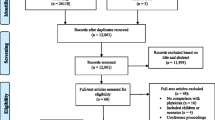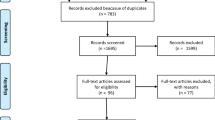Abstract
Introduction
Research is fundamental to bridging theory, practice and education in orthopaedics. Following the restructuring of the surgical training pathway in Ireland, the opportunity to undertake clinical- or lab-based research has fallen.
Aims
Our aim was to investigate the trends of research in orthopaedics and the implications there.
Methods
We reviewed the trend in publications by Irish trauma and orthopaedic (T&O) trainees over the past 20 years across three different classes of journal. We also reviewed the Irish participation in the annual British Orthopaedic Association (BOA) meeting over the past 10 years as well as the rates of abstract submission to the annual Irish Orthopaedic Association (IOA) meeting.
Results
We found that publication rates were as follows: JBJS 2005–2010 mean 4.8 vs. 2000–2005 mean 1.6 and 2010–2015 mean 0.2; Injury 2005–2010 mean 3.6 vs. 2000–2005 mean 3.4 and 2010–2015 mean 2.2; IJMS 2010–2015 mean 4.4 vs. 2000–2010 mean 1.1. The number of Irish presentations at the BOA fell from a mean of 5 between 2000 and 2010 to a mean of 1.2 between 2011 and 2017. The rate of IOA abstract submissions compared over the same period has fallen by 21%. We also found that 4% of Irish orthopaedic publications in the IJMS were scientific in nature; this figure was 3.7% of publications in injury and 32.6% in JBJS (UK).
Conclusions
There has been a significant decrease in publication rates by T&O trainees in high-quality journals. There has also been a notable decline in Irish representation at the BOA and a drop in the number of abstract submissions to the IOA. We suggest these findings coincide with the streamlining of surgical training in Ireland, which does not provide for the pursuit in research that is crucial to our practice as clinicians, to the future of our specialty and to the Irish orthopaedic representation internationally.








Similar content being viewed by others
References
Martin LF, O'Leary JP (1997) The surgeon’s role in improving medical care. Am J Surg 174(3):294–296
Ubbink DT, Legemate DA (2004) Evidence-based surgery. Br J Surg 91(9):1091–1092
Lilford R, Braunholtz D, Harris J, Gill T (2004) Trials in surgery. Br J Surg 91(1):6–16
McLeod RS, Wright JG, Solomon MJ, Hu X, Walters BC, Lossing A (1996) Randomized controlled trials in surgery: issues and problems. Surgery 119(5):483–486
Howes N, Chagla L, Thorpe M, McCulloch P (1997) Surgical practice is evidence based. Br J Surg 84(9):1220–1223
Wente MN, Seiler CM, Uhl W, Büchler MW (2003) Perspectives of evidence-based surgery. Dig Surg 20(4):263–269
Garas G, Ibrahim A, Ashrafian H, Ahmed K, Patel V, Okabayashi K, Skapinakis P, Darzi A, Athanasiou T (2012) Evidence-based surgery: barriers, solutions, and the role of evidence synthesis. World J Surg 36(8):1723–1731
Brand RA (2009) Femoroacetabular impingement: current status of diagnosis and treatment: Marius Nygaard Smith-Petersen, 1886–1953. Clin Orthop Relat Res 467(3):605–607. https://doi.org/10.1007/s11999-008-0671-z
Gulotta LV, Wiznia D, Cunningham M, Fortier L, Maher S, Rodeo SA (2011) What’s new in orthopaedic research. J Bone Joint Surg Am 93(22):2136–2141
Lu C, Buckley JM, Colnot C, Marcucio R, Miclau T (2009) Basic research in orthopedic surgery: current trends and future directions. Indian J Orthop 43(4):318–323
Lee MJ et al (2016) Academic requirements for Certificate of Completion of Training in surgical training: consensus recommendations from the Association of Surgeons in Training/National Research Collaborative Consensus Group. Int J Surg 36(Suppl 1):S24–s30
Buckwalter JA (2003) Integration of science into orthopaedic practice: implications for solving the problem of articular cartilage repair. J Bone Joint Surg Am 85(suppl 2):1–7
Basson MD (2014) The role of the investigative surgeon: asking questions and questioning answers. JAMA Surg 149(11):1188–1190. https://doi.org/10.1001/jamasurg.2014.724.
Robertson CM, Klingensmith ME, Coopersmith CM (2009) Prevalence and Cost of full-time research fellowships during general surgery residency—a National Survey. Ann Surg 249(1):155–161. https://doi.org/10.1097/SLA.0b013e3181929216.
Abramson M (1977) Improving resident education: what does resident research really have to offer? Sect Otolaryngol Am Acad Ophthalmol Otolaryngol 84:984–985
Souba WW, Tanabe KK, Gadd MA, Smith BL, Bushman MS (1996) Attitudes and opinions toward surgical research. Ann Surg 223:377–338
Boninger ML, Chan L, Harvey R, Pine ZM, Helkowski W, Garrison CJ, Tran T, Levin H, Levy CE (2001) Resident research education in physical medicine an rehabilitation: a practical approach. Am J Phys Med Rehabil 80:706–712
Konstantakos EK, Laughlin RT, Markert JR et al (2010) Assuring the research competency of orthopedic graduates. J Surg Educ 67(3):129–134
Downing A, Morris EJA, Corrigan N, Sebag-Montefiore D, Finan PJ, Thomas JD, Chapman M, Hamilton R, Campbell H, Cameron D, Kaplan R, Parmar M, Stephens R, Seymour M, Gregory W, Selby P (2017) High hospital research participation and improved colorectal cancer survival outcomes: a population-based study. Gut 66(1):89–96
McDonald CK (2018) Research amongst Irish surgical trainees: what’s the trend. Ir J Med Sci. https://doi.org/10.1007/s11845-017-1621-0
Ko CY, Whang EE, Longmire WP Jr, McFadden DW (2000) Improving the surgeon’s participation in research: is it a problem of training or priority? J Surg Res 91:5–8
Author information
Authors and Affiliations
Corresponding author
Ethics declarations
Conflict of interest
The authors declare that they have no conflicts of interest.
Ethical approval
This article does not contain any studies with human participants or animals performed by any of the authors.
Rights and permissions
About this article
Cite this article
White Gibson, A., Clesham, K., Tully, O. et al. The changing tides of Irish orthopaedic research. Ir J Med Sci 188, 141–147 (2019). https://doi.org/10.1007/s11845-018-1821-2
Received:
Accepted:
Published:
Issue Date:
DOI: https://doi.org/10.1007/s11845-018-1821-2




